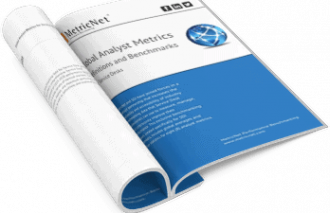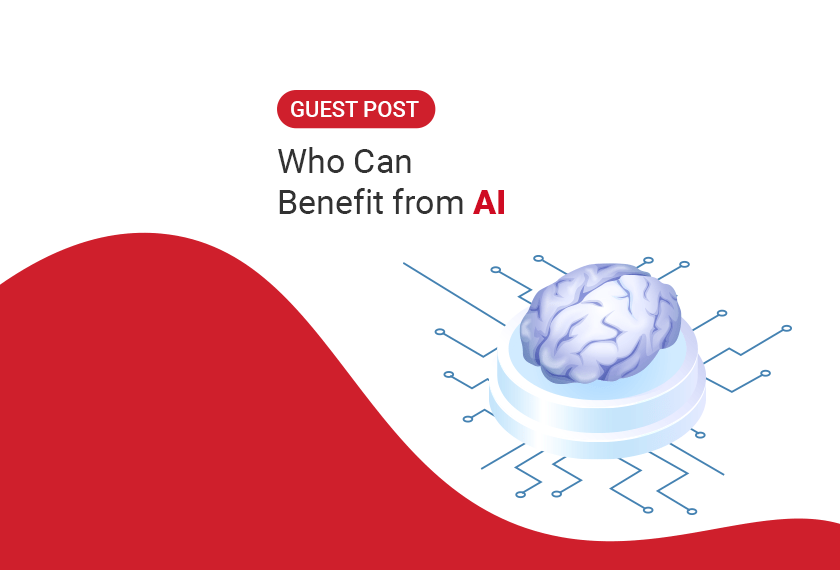
The rise of artificial intelligence (AI) has been a hot topic of discussion lately, and for a good reason. AI has dramatically impacted our lives, from smart assistants to self-driving cars. But who can actually benefit from the use of AI? You might be surprised to learn that anyone, from the average person to large companies, can benefit from AI technology.
In this blog post, we will explore how AI can be used to improve our lives, from improving education to making the workplace more efficient.
So, if you’ve ever been curious about how AI can benefit you, read on!
How is AI Changing the Game for Industries
AI has been around since the 1950s, but recent technological advances have created more complex and sophisticated AI systems. It has been used in different industries and applications, from robotics and self-driving cars to intelligent home assistants and healthcare. As AI technology evolves, it will open new possibilities for businesses, governments, and individuals.
But to be more specific, let us look into the sectors that may or have already been benefitting from AI:
#1 Businesses
There are many ways that businesses can benefit from AI. For one, AI can help automate mundane and tedious tasks, allowing employees to focus on more complex problems. It also allows for better customer service since it can analyse customer data to create personalised experiences.
AI can also provide businesses with predictive analytics that can be used to identify potential problems and opportunities before they arise. It can even help businesses develop new products and services by uncovering previously unseen patterns in data.
From improving marketing campaigns to automating customer service, businesses of all sizes can take advantage of AI to:
- Streamline processes
- Improve efficiency
- Gain a competitive edge
When it comes to recruitment, AI can ease the recruitment process by quickly analysing large numbers of online resumes and job descriptions to find the best match for a particular role.
It can reduce bias by ensuring candidates are evaluated fairly without any personal preference or judgment entering consideration.
On the operational side, AI can help optimise production lines and warehouses to ensure maximum efficiency. Furthermore, through predictive maintenance, AI can detect when machines encounter errors like OS feature update problems or suggest a replacement before they fail, which saves time and money.
In addition to helping with operations, AI-powered chatbots can give customers 24/7 access to information regarding products and services and offer personalised recommendations based on previous purchases.
Likewise, AI-driven facial recognition systems are increasingly being adopted as an extra layer of security. By utilising AI, businesses can increase safety while simultaneously streamlining operations and increasing productivity.
A Look at Companies Reaping the Rewards of AI
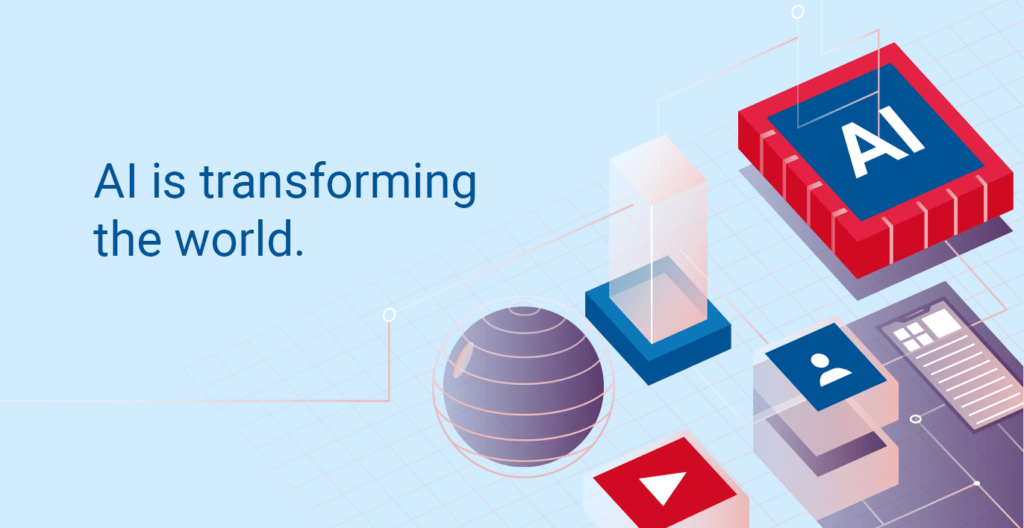
Here are a few examples of businesses that have taken advantage of AI to enhance their operations and customer experience:
- Amazon utilises AI in their warehouses for product tracking and inventory management.
- Netflix uses AI to provide personalised movie recommendations.
- Walmart has deployed AI-powered robots to scan shelves for out-of-stock items.
- JPMorgan Chase uses AI for fraud detection and risk management.
- Airbnb uses AI to personalise search results and recommendations for potential guests.
- United Airlines uses AI to improve customer service and predict flight delays.
#2 Healthcare
The healthcare sector has rapidly adopted AI technology in recent years, and the potential benefits are enormous.
AI-based technologies can help:
- Diagnose diseases more accurately and quickly
- Assist with drug discovery and development
- Streamline administrative tasks such as billing and coding
- Offer personalised care recommendations to patients
Diagnose diseases and assist with drug discovery and development
In the diagnosis field, AI-based algorithms can help doctors detect medical conditions early and accurately, leading to improved patient outcomes. For example, AI can be used to detect the presence of cancer in medical images, making the diagnosis process faster and more accurate.
It can also help identify trends in medical data that could be used to develop better treatments, therapies, drug discovery and development.
Streamline administrative tasks
AI can also be used to streamline administrative tasks within the healthcare sector and help improve communication between doctors, nurses, and other healthcare team members.
It can also automate data entry processes, freeing staff from more important tasks. By automating appointment scheduling, billing, and record-keeping processes, AI helps make the healthcare system more efficient and cost-effective.
Offer personalised care recommendations to patients
Moreover, AI can be used to provide personalised care recommendations to patients based on their individual needs. It can track a patient’s vital signs, medical history, and lifestyle choices to provide tailored advice and treatment plans. This helps doctors make better decisions about the care they provide, leading to improved patient outcomes.
AI-based technologies are already being used in hospitals and healthcare clinics worldwide, with some of the most impressive examples being IBM Watson Health, Ada Health, and Cogito AI. These technologies are helping to revolutionise the healthcare sector by making it more efficient, cost-effective, and personalised.
#3 Education
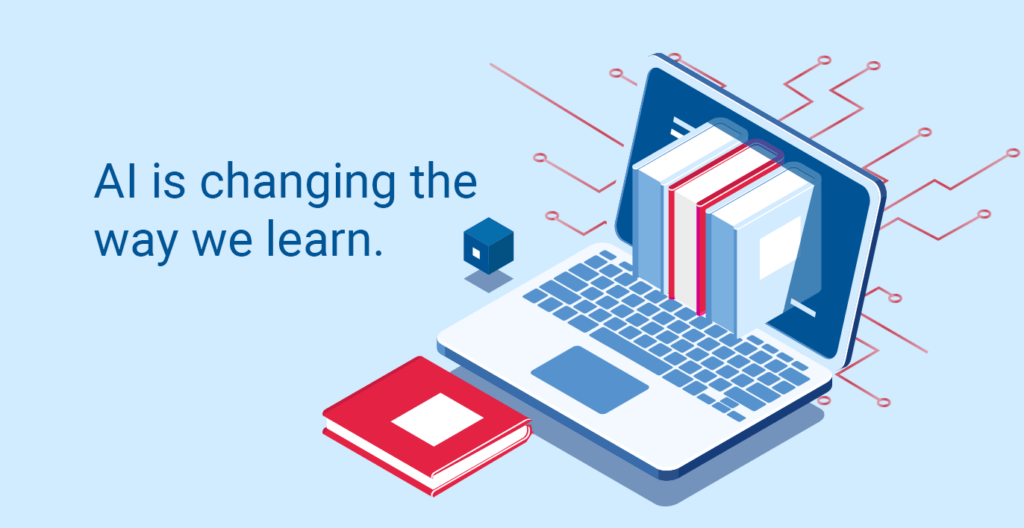
AI is changing how students learn and develop skills in the educational sector. It can help teachers save time by automating grading and providing feedback to students faster than ever before. It can also be used to personalise learning experiences, tailoring the curriculum and teaching style to an individual’s needs.
AI can help create virtual learning environments, provide personalised tutoring for students, and helping to identify potential problems with learning. It can also help automate the creation of lesson plans and assignments, making teaching more efficient and enjoyable for teachers.
AI has already been adopted by many schools, universities, and other educational institutions, proving its potential to revolutionise the education system. It can help improve the efficiency of administrative tasks such as student enrollment or tracking attendance records.
The ability to use predictive analytics enables administrators to anticipate future trends and resource requirements better.
AI could provide insights into understanding student motivation levels, leading to improved outcomes. With these capabilities, AI could drastically improve overall educational outcomes worldwide.
#4 Customer support
AI technology can also be used to create virtual assistants who can provide customer support and troubleshooting information directly to customers. By utilising automated customer service agents, businesses can save on staffing costs and increase customer satisfaction by providing rapid response times.
Machine learning can be utilised to quickly answer customer questions and respond intelligently based on previous interactions with similar customers.
Overall, AI can aid in creating personalised customer experiences, fostering loyalty, and increasing sales over time. By using AI to understand user preferences and behaviours, companies can deliver content tailored to individual users, resulting in increased engagement and repeat business.
#5 Retail
Artificial intelligence in the retail industry is quickly becoming necessary for staying competitive in today’s market. In general, AI can help retailers:
- Create better customer experiences and maximise profits
- Provide personalised product recommendations
- Increase customer loyalty
- Automate store operations
AI-enabled chatbots are already used to provide customer service and answer customer questions. Retailers can use machine learning algorithms to predict customer demand and create more accurate pricing strategies.
They can use it to analyse customer data, provide better insights into customer behaviours, tailor their offerings, and develop more effective marketing campaigns.
In addition, AI can be used to automate processes such as inventory management and order fulfilment. Automated checkout systems are also being implemented in some stores to streamline the process.
By leveraging AI technology, retailers can significantly improve their operational efficiency, reduce costs, and increase profits. AI can even help them detect fraud faster, optimise their pricing strategies, and enhance their supply chain.
#6 Advertising
AI can also benefit retailers in terms of advertising. For instance, by analysing customers’ browsing histories and preferences, AI can recommend targeted ads most relevant to individual customers. AI-driven ads can have a much higher conversion rate compared to traditional ads.
AI has even enhanced the shopping experience at brick-and-mortar stores by enabling customers to find what they need faster with interactive search functions or get tailored suggestions based on their past purchases.
These capabilities have enabled retailers to offer their customers an enhanced level of convenience that was previously impossible without the aid of AI.
Overall, the potential applications of AI within the retail sector are vast, making it an invaluable tool for businesses that want to remain competitive and profitable.
#7 Manufacturing
Manufacturing is another sector that can benefit immensely from AI technologies. AI can make production systems much more efficient and cost-effective while increasing accuracy and safety. It can automate various production processes, such as quality control, assembly line tasks, and sorting materials. This automation can help reduce labour costs and minimise mistakes that can lead to costly delays or lost profits.
AI can also be used for predictive analytics in manufacturing, allowing for better forecasting and inventory management. This can improve supply chain optimisation and prevent overproduction, saving manufacturers time and money.
AI solutions can also monitor equipment performance and alert operators when maintenance is needed, reducing downtime and ensuring equipment runs at peak efficiency.
Furthermore, AI can help businesses identify potential hazards or issues before they become serious problems. For example, AI algorithms can monitor the production floor in real-time and alert staff members if they notice anything out of the ordinary.
#8 Transportation
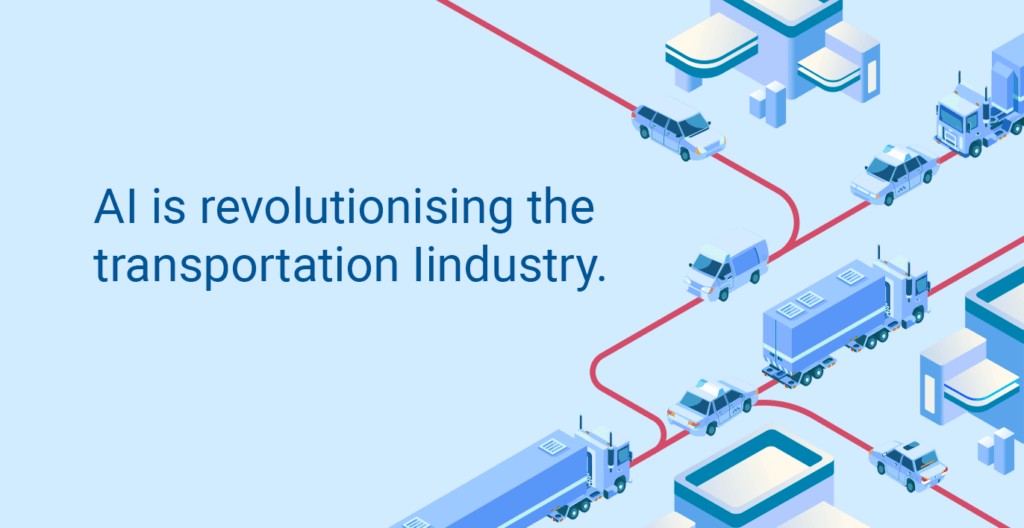
Self-driving cars, drones, and automated delivery services are all possible thanks to AI. Self-driving vehicles can drastically reduce traffic congestion, save time and money on fuel costs, and improve safety.
Drones can be used for many tasks, such as delivering packages and gathering data for traffic control systems. Automated delivery services can increase efficiency in the supply chain and allow for faster delivery times.
Additionally, AI can be used to analyse traffic patterns in real time and recommend route changes to minimise delays and improve customer satisfaction. With AI, the transportation industry has a great opportunity to improve how people move around and make their lives easier.
By utilising it, we can create more efficient and sustainable modes of transportation, reducing our dependence on fossil fuels while providing better service at lower costs.
All this shows just how beneficial artificial intelligence can be when applied to transportation – and there are still plenty more possibilities yet to be explored!
In Summary
It is clear that AI can be a powerful tool for many sectors. It offers many advantages, such as increased efficiency, improved accuracy, and faster decision-making. It can help reduce costs and increase profits for businesses while providing better patient care in the healthcare sector and better teaching tools for education.
It can help retailers personalise customer experiences and make smarter decisions on inventory management. It can help manufacturers automate processes, streamline production, and improve quality control. And it can help improve safety and reduce fuel consumption in the transportation industry.
AI is already being used in these industries, but as technology advances even more, organisations will begin to realise its potential and benefit from it.

Jessica Bullet
As a Journalist by profession, Jessica Bullet has extensive experience in writing about various topics under the sun, including technology, gadgets, travel, social media, and digital marketing. If she's not writing articles for Software Tested, she's either watching her favorite TV series or playing video games.






















